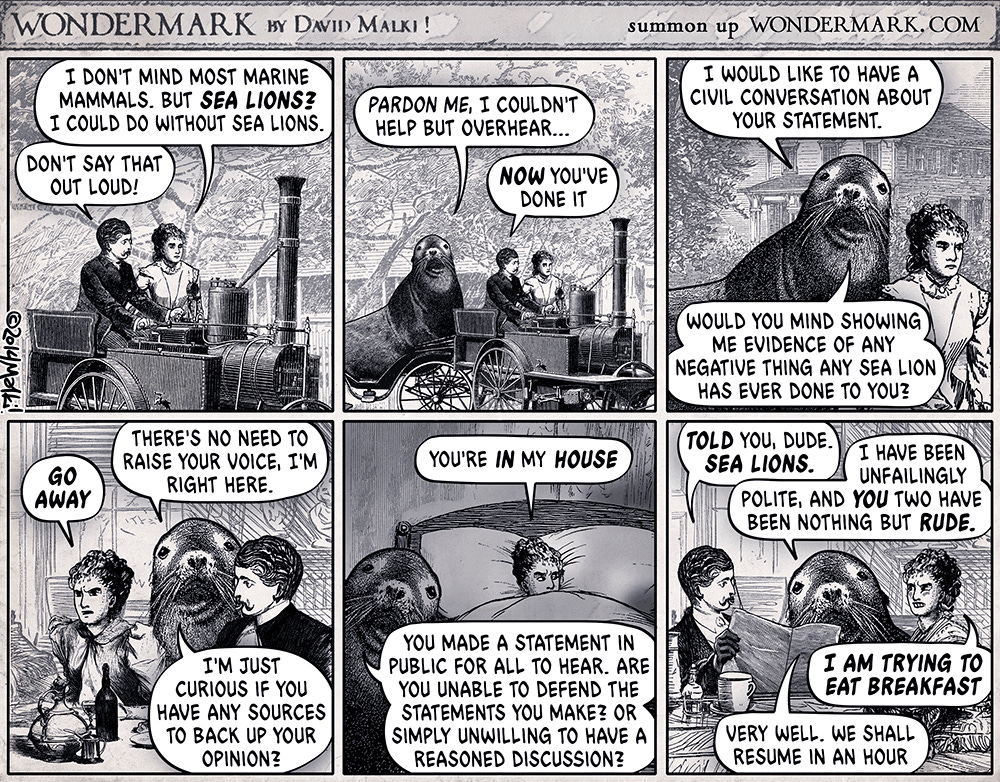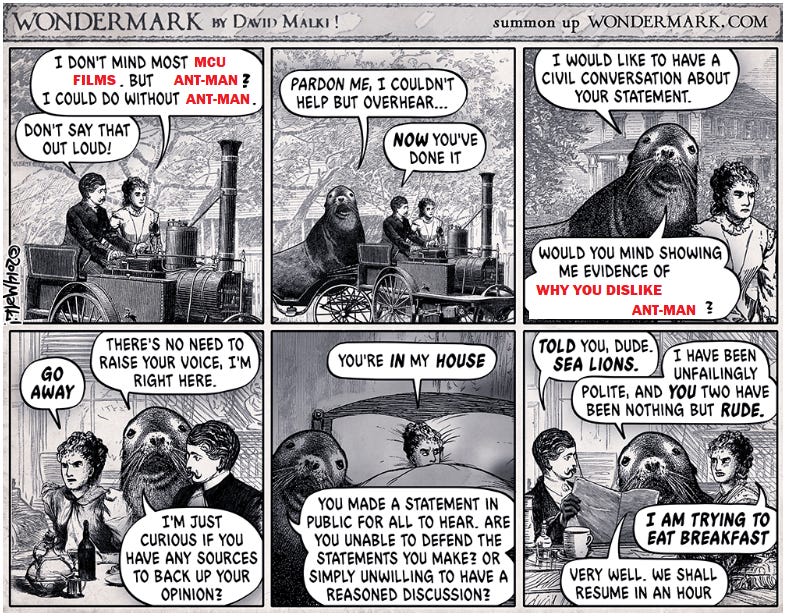Of Course The Sea Lion Is Right
Even all these years later, his honor is still worth defending
When someone calls you a “sea lion” on social media, it tells you about as much as it does if someone calls you a racist or a bigot or a cuck or an SJW: nothing.
If you’re unfamiliar with this term, you probably missed a very strange, very hard-to-explain conversation about internet harassment that occurred almost a decade ago. Someone should do a deep dive on this moment, but during it, seemingly everyone in journalism was talking about the evils of online harassment. Somewhere along the way, harassment came to be defined not only as, like, sending death threats to someone or doxxing them or suicide-baiting them (execrable and all-too-common behaviors), but other, much subtler stuff. At the extremes, even “asking follow-up questions” or “quote-retweeting someone to lightly ridicule them” were taken to be harassment, though of course only when done by Bad People (Good People could do all of this as much as they wanted). I’ve written a bit about this before.
Sealioning was lumped into this conversation. And it was important enough that Merriam-Webster’s blog did a post on it, defining the concept thusly:
Sealioning refers to the disingenuous action by a commenter of making an ostensible effort to engage in sincere and serious civil debate, usually by asking persistent questions of the other commenter. These questions are phrased in a way that may come off as an effort to learn and engage with the subject at hand, but are really intended to erode the goodwill of the person to whom they are replying, to get them to appear impatient or to lash out, and therefore come off as unreasonable.
So it’s really an accusation of bad faith. And in most cases it’s hard to prove, because you can’t look inside someone’s head.
My own experience has been that people endlessly use this accusation, as well as its cousin, “just asking questions,” which is sometimes referred to with the colorful expression “JAQing off,” to prevent any criticism or interrogation of positions they have expressed online. It’s a form of projection: often it’s the person accusing the other of sealioning or just asking questions who is acting in (a form of) bad faith, because they express a controversial opinion online, and then, when pressed on it — even politely — respond by saying, “Oh right, like you’re really curious about that! Okay, sea lion!”
According to Merriam-Webster, the term comes from a 2014 Wondermark webcomic strip called “The Terrible Sea Lion.” I can’t say for sure you see this one passed around online more than you see the xkcd “Free Speech” strip (one of Randall Munroe’s very rare missteps), but suffice it to say that it has also gone very viral.
Please give the original site a click as well, but here it is:
It definitely wasn’t the intention of the author, David Malki, but his strip accidentally reveals some of the limitations of sealioning discourse. Because for the most part, the titular sea lion is the good guy in this strip! (I guess we don’t know the sea lion is male, but on the other hand, come on, seems like a safe bet.)
The whole thing starts with the sea lion overhearing a woman expressing eliminationist rhetoric about his species: “I could do without sea lions.” He politely challenges her to provide evidence to support such a heinous view. “I would like to have a civil conversation about your statement,” he says. “Would you mind showing me evidence of any negative thing any sea lion has ever done to you?”
This seems reasonable enough. If you overhear someone talking about how your entire species shouldn’t exist, don’t you have a right to confront them, especially if you do it in a polite, nonviolent way? Apparently not. This sea lion is, after all, sealioning, which we all (now) know is a form of online harassment. Or real-life harassment, in this case!
This is not my usual style, as I am conflict averse and have never been in a physical altercation in my adult life, but around 2009 I was out with some friends in Brighton, Mass., fairly drunk, and overheard a guy at the mediocre pizza place where we ended up after some beers make an anti-Semitic comment. I told him I was Jewish and asked what his problem with Jews was, and he mumbled something before piping down. Who would have thought that I had wronged him?
Now, things get pretty ridiculous in the bottom panels. The sea lion shows up at the couple’s house and apparently sleeps over to continue badgering (well, sealioning) them in the morning. That’s not good.
Throughout this strip, though, the sea lion comes across as genuinely and rightfully aggrieved, and keep in mind that despite the harsh blow of the insult he overheard, all he’s trying to do is to understand, and presumably, to help the woman learn the error of her own ways. His premise is eminently reasonable: “You made a statement in public for all to hear. Are you unable to defend the statements you make? Or simply unwilling to have a reasoned discussion?”
I definitely don’t endorse showing up inside someone’s house to ask them polite questions. But I’m even more opposed to eliminationist rhetoric! Plus, the inside-the-house stuff doesn’t even apply to our real-world sea lion conversation, because in zero percent of cases are sea lions barging into a private space to demand answers; you can’t have sealioning without “overheard” public online utterances.
I’m clearly not alone in being Team Sea Lion. In a subsequent “2014 errata” post published early the following year, Malki addressed this issue:
It has been suggested that the couple in this comic, and the woman in particular, are bigots for making a pejorative statement about a species of animal, and then refusing to justify their statements. It has been further suggested that they be read as overly privileged, because they are dressed fancily, have a house, a motor-car, etc. This is, I suppose, a valid read of the comic, if taken as written.
But often, in satire such as this, elements are employed to stand in for other, different objects or concepts. Using animals for this purpose has the effect of allowing the point (which usually is about behavior) to stand unencumbered by the connotations that might be suggested if a person is portrayed in that role — because all people are members of some social group or other, even if said group identity is not germane to the point being made.
Such is the case with this comic. The sea lion character is not meant to represent actual sea lions, or any actual animal. It is meant as a metaphorical stand-in for human beings that display certain behaviors. Since behaviors are the result of choice, I would assert that the woman’s objection to sea lions — which, if the metaphor is understood, is read as actually an objection to human beings who exhibit certain behaviors — is not analogous to a prejudice based on race, species, or other immutable characteristics.
My apologies if the use of a metaphorical sea lion in this strip, rather than a human being making conscious choices about their own behavior, was in any way confusing.
As for their attire: everyone in Wondermark dresses like that.
Apology accepted! Not a big deal.
But at the risk of overexplaining things, a great deal is leaning on “if taken as written,” because it matters a lot what sort of statement is being objected to. I think a quick revision can help make this point clearer:
In this version, the sea lion is an obsessively annoying fan of the Marvel Cinematic Universe, and he just can’t countenance someone disliking the Paul Rudd vehicle Ant-Man.
The internet is chock-full of obsessive fanboy/girl losers like this who cannot get over the fact that people disagree with them about subjective cultural matters. Many of them are far angrier and more aggressive than the sea lion. But in this version, it’s the low stakes of the initial comment that makes it obvious the sea lion is an annoying fool. Okay, she dislikes Ant-Man? Who cares?
There is a very wide gulf between disliking Ant-Man and effectively wishing genocide on sea lions, and that’s why the initial comic just doesn’t work as intended. You can’t say, “Well, it’s satire — I used this one example to illustrate this other thing.” Or if you have to say it, it isn’t very good satire. This isn’t a matter of not getting Malki’s strip; rather, he picked an example that mucked up the entire point he was trying to make.
But that gets to some of the issues here: in fact, the norms about when it is and isn’t appropriate to pop up and ask questions or ask for clarifications in online settings remain unsettled. I’m generally of the view that if you make a public statement, you should certainly be prepared to defend or expand on it, because if you’re not, what’s the point of making it publicly? The public internet shouldn’t be a hugbox. I think a lot of people who cry sea lion! want to have it both ways; they want to leverage the public nature of Twitter (or other platforms) to expand their reach and influence, but they only want to get positive feedback.
Well. . . tough! That isn’t how it works, and it isn’t how it should work. A lot of people have a lot of questions. You, the person being asked that question, certainly have the right to block interlocutors if they become too aggressive, or if they are confronting you over an ultra-low-stakes, subjective issue like the Marvel Cinematic Universe, but by that same token you can’t really expect those who are genuinely offended or confused by your remark not to respond, right?
What it comes down to is that a lot of the conversation about online harassment is silly, designed to derail, and relies on idiosyncratic and non-widely-held ideas about discourse. People who call others “sea lions” often aren’t worth taking seriously.
Questions? Comments? Sealioning? I’m at singalminded@gmail.com or on Twitter at @jessesingal. Image: “Ecuador, Galapagos Islands, Seymour Norte, young sea lion on sandy beach” via Getty.





Tumblr feminism pioneered that particular obnoxious ad hominem approach that the woke use to shut down dissent and avoid having to defend their positions. Not very clever or coherent, but very impressed with itself. It was a jarring departure from liberal norms then. Now it is, sadly, the air we breathe.
I really think that terms like this were invented by people who, on some level, are fully aware that they aren't able to justify their opinions in an adversarial debate. If you assert "I believe X", someone asks you to explain why you believe X, and you can't, it will be very embarrassing for you. To preempt this, you have to develop a norm that even asking people to justify their opinions somehow constitutes "harassment" or "bullying" or "gaslighting" etc. (but only if this request is being made of people who hold the "correct" opinions, of course).
This is the downside of ideologies which spread, not via reasoned argument, but via conformity and the implied threat of ostracisation. You end up with millions of people who know exactly what the opinions they're supposed to hold are, but who are powerless to actually defend those opinions in a debate.